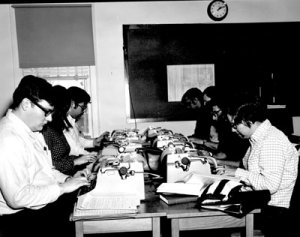 If there's ever a debate that I seem to run across time and time again among my colleagues, it's whether journalism education is necessary. The argument? Some find journalism education to be a joke and a waste of money, and others find it enlightening and essential. Largely unresolved, the issue comes and goes with the headlines - yet students matriculate each semester. So who's right?
If there's ever a debate that I seem to run across time and time again among my colleagues, it's whether journalism education is necessary. The argument? Some find journalism education to be a joke and a waste of money, and others find it enlightening and essential. Largely unresolved, the issue comes and goes with the headlines - yet students matriculate each semester. So who's right?While "neither fer J-school nor agin it," Slate's Jack Shafer wonders (cached while Slate's servers are down), "if J-schools are of only marginal value to the publications they allegedly serve, why not torch Columbia and the other hundred-plus degree-awarding journalism programs and have done with it?" Shafer's fear is that journalism will become too academic and less practical:
"I fear the day that the J-school credential assumes such an aura that it becomes a prerequisite for a newspaper job, the way the B.A. credential has. Journalism depends on uncredentialed losers, outsiders, dilettantes, frustrated lawyers, unabashed alcoholics—and, yes, creative psychopaths—to keep its blood red."
To note is that Shafer's never had any formal training, like a large portion of the current class of operating journalists. Fast-forward to a younger take on the issue by aspiring journalist John Buchel:
"I want to get into the journalism school for what is today a pretty unconventional reason: I love journalism."
But Shafer, like others, thinks that the experience of a real newsroom trumps that of the classroom. And he's right - there's nothing that compares to the real deal. But something tells me it's a sure bet that it's easier once you've been through the classroom. What Jack Shafer seems to forget is all the half-reported, sourceless, copy-ridden stories he probably handed in when he was younger. Maybe he was lucky enough to have a professional mentor to teach him the tricks, maybe he's a graduate of the school of reporting hard knocks. But in the modern age of 24 hour news cycles, it's hard to argue against the fact that a new journalist needs to know how to write, report and edit before he turns in his first story.
And most of all? A new reporter needs to know why he or she is doing those things in the first place. Columbia's Lee Bollinger gets it, and he didn't have to recommend extending the school's yearlong curriculum to do it.
Journalism school is not trade school. There are themes to identify, issues to address and enough important dialogue to constitute this post, this blog, and Jack Shafer's very position at Slate. It's true that professors have to remove themselves somewhat from the working world to teach - leading to the disconnect that Shafer hones in on - but this is the same balance that every academic program faces: research vs. teaching. The difference is a journalism professor's research could land on the front page of your local paper.
If a single year of graduate school is what's at stake, it's my opinion that Jack Shafer needs to go back to school. Sure, you don't need a business degree to turn out like Donald Trump, but did anyone ever stop the young entrepreneur from going? And how about all those computer science majors?
So it seems journalism education is about as useful as any other liberal arts education. Yet many critics say journalism graduates have an elitist sense and don't work like their uneducated peers. But is this the result of immediately facing prejudice for having gone in the first place, calling their expenditure into question and forcing them to hide their academic history just to avoid bias and condemnation by the very people they studied for?
Maybe this goes deeper than education. Maybe this is the trickle-up result of competition. Are journalists in it for their own kind?
I can't say for sure. I don't know about you, Jack, but I could certainly use one less half-educated, ethic-less Jayson Blair in the newsroom. And someone's one-time fee of $50,000 seems worth the repair of a publication's work, a profession's reputation, and a whole slew of late-night edits.


![Editorialiste [at] gmail](https://blogger.googleusercontent.com/img/b/R29vZ2xl/AVvXsEjzDvlHqUd5msfCmRq2Q5EZRpn_nbVg33bjiUhLEigM_5fudZhIHvuAVxB4_MS0xn-cQ0EKyjxOua1ysQ4NdMzyvhg1oSVTv6OJAarhVTqG0BBkJKTjqBhwMjrMGOANWxT8l8rKFg/s220/editorialiste_logo.jpg)
No comments:
Post a Comment